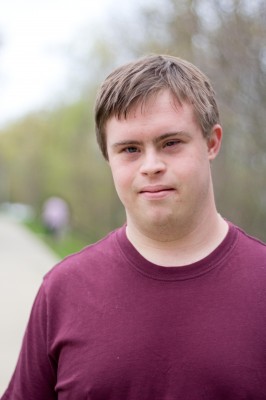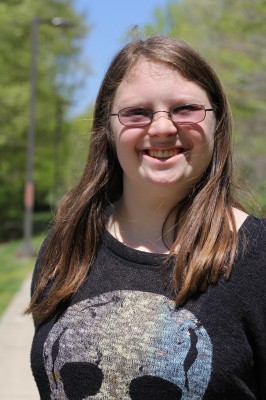Students who participate in Mason Life speak out on the strengths and benefits the program provides to those with intellectual and developmental disabilities.
“Should I go to college and continue my education or skip college and get a job,” is a commonly asked question among young adults. Those who have jobs already know want it takes to keep a job, while college can provide a higher level of self-understanding as well as sociological and psychological expertise. In addition, college familiarizes people with inter- esting areas of study. College can be for everyone, including those who have disabilities. However, those with disabilities face unique challenges in a higher education environment. First, how can we help people with disabilities to get a higher level of education just like their brothers and sisters? Second, can they handle and stay in college. I’ve done some research to prove that they can. From my research I found a program that helps people with disabilities.
Mason LIFE (Learning Into Future Environments) is a supportive program that helps students with disabilities. The program examines the individual needs and wants of each student alongside their parents, and creates a course of study focusing on three areas: academics, employment, and the development of independent social skills.
Mason LIFE teaches academic courses, including literature, history, science, and math, in a unique style that depends primarily on the individual student’s year and course load. Mason LIFE tackles employment in a similar manner: fresh- men are taught tho think of what they want out of a job and learn how to get them. Seniors, by contrast, generally work within their area of interest until they graduate. Mason LIFE’s
teaching of independent social skills is structured mainly around helping students life on or off campus. However, how independent they are allowed to be is depends on the pace of each student.
I asked students in the Mason LIFE program “How did college change you?” and second year student Zeb Loico said, “inspiring because all people with disabilities don’t get this opportunity”. Why don’t people with disabilities have this opportunity? I also spoke to some Mason students without disabilities.
“I think that my college experience is similar to a person with a disability in that we all have to make a big positive change in our lives,” said student Ryan Weisser.
The staff and instructors of Mason LIFE also agree. Their responses are very inspiring. “Each student is unique in how they learn. When you are able to work together and build off of the students strengths it’s fun to watch them blossom,” said [name needed]. Based on this information, we can infer that strong supports can overcome the barrier of the disability itself.
Going to college is really for those who need time to figure out how their interests. The Mason LIFE Program can help those with disabilities accomplish this task and achieve their goals.
—ADRIAN F. STAFF WRITER
Gaining employment skills is essential to an individual’s career path. The Mason LIFE program is made up of students with disabilities who have the ability to work just like everyone else and gain experience through a class called “Employment”. This course will provide students with necessary skills to get and keep a job as well as complete a portfolio for their future job.
The teachers for this course, Ms. Candace McTeer and Mr. Andrew Hahn, choose each students employment site through a person centered planning meeting. McTeer says, “If we can’t give a student one of their top three choices we pick something they would be good at or something we know they’d enjoy.”
These students are given a job site for the semester accord- ing to their likes and dislikes. First year, Jeffery Eskridge, works in the mailroom organizing the mailboxes. He would love to continue working there in the future. “I am happy to work at the mailroom because I like to work with other people,” said Eskridge.
Another first year, Stephanie Vostal, is lucky enough to work in the Mason LIFE office. She completes secretarial work, such as going on the computer and answering the phones. “I am happy to work here because I get to stay inside,” Vostal said.
This second year, Eesha Minocha, is employed at an off campus job site to work and develop her independence. Minocha works at the Humane Society where she gets to play with cats. She makes sure that all doors are closed and does not go in the room with the sick cats. “I think helping and working with animals is good and I am against animal abuse. I would love to work here again,” Minocha said.
Another student in the program, first year Rachel Fishbein, loves her work at Mason’s Child Development Center, also
known as the CDC. “I am happy to work here because I’ve always loved children,” said Fishbein. Fishbein cleans up the lunches, reads to the kids, sets up naptime, and puts them to sleep. “I would love to work here again because the children are so much fun.”
Part of this class allows students to put
together a professional portfolio. The portfolio consists of five sections including the students’ resume, skills, interests, work evidence and supports. McTeer finds the portfolios to be essential because they “help the student understand what they’re good at and the skills they acquired in school and at first employment sites”.
The Mason LIFE Employment class has definitely made an impact on the students’ employment decisions after finish- ing the program. Some Mason LIFE alumni are currently employed at the places they worked when they were students of the program. Three such places are Accessible Instructional Materials (AIM) Virginia, Pitney Bowes Mail Service and the Recreation Athletic Center (RAC) here on campus.
Hahn says the program “does an outstanding job in allotting students employment opportunities they may not receive else- where. These unique experiences go a long way in preparing our students to be contributing members in the workforce after graduation.”
—JORDYN DANNENBAUM STAFF WRITER








Comments